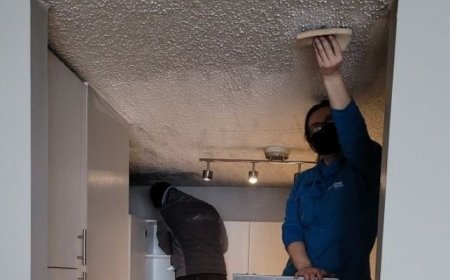Combatting Peri‑Implantitis: Coatings, Cleaning, and Prevention Tips
Learn how coatings, cleaning habits, and prevention strategies can help protect your dental implants from peri‑implantitis and related complications.

Dental implants have transformed modern dentistry by offering a long-term solution for missing teeth. However, like natural teeth, implants are also vulnerable to infections and complications. One common issue faced by patients is peri?implantitis a condition that affects the tissues around a dental implant, leading to inflammation and bone loss.
For anyone considering or already living with dental implants, understanding how to prevent peri?implantitis is essential. In this blog, well explore how advanced implant coatings, proper cleaning techniques, and smart prevention tips can help you maintain a healthy smile. Well also highlight the important role an orthodontist can play in supporting your long-term implant success.
What is Peri?Implantitis?
Peri?implantitis is an inflammatory condition that affects the soft and hard tissues surrounding a dental implant. It starts with redness and swelling of the gums, and if left untreated, it can lead to the loss of the supporting bone and even the implant itself.
Its similar to gum disease, but it occurs around implants instead of natural teeth. The main causes include:
- Poor oral hygiene
- Smoking
- Diabetes and other health conditions
- Excessive biting forces due to misalignment
- Lack of regular dental check-ups
Symptoms may include bleeding when brushing, bad breath, gum swelling, pus formation, and eventually loosening of the implant. If youre noticing any of these signs, its crucial to seek help from your dentist or orthodontist without delay.
How Do Implant Coatings Help?
Modern advancements in implant technology have introduced special coatings that help protect against bacteria and support healthy bone integration.
1. Antibacterial Coatings
Some implants are coated with materials like silver ions or titanium dioxide, which help resist bacterial growth. This reduces the chances of infection during and after healing.
2. Bioactive Surfaces
These coatings encourage the growth of bone cells, helping the implant bond more firmly with the jawbone. A better bond means greater stability and lower risk of complications.
3. Hydroxyapatite Coatings
This mineral-based coating mimics the natural components of bone and helps accelerate the healing process. It also reduces the chances of soft tissue inflammation.
When selectingdental implants Wimbledon, its wise to ask your dentist about the types of coatings available and their benefits, especially if youre at higher risk of gum problems or have had periodontal issues in the past.
Cleaning Your Dental Implants the Right Way
Keeping your implants clean is one of the most effective ways to prevent peri?implantitis. There are two main aspects to this: home care and professional cleaning.
At-Home Cleaning Tips
Just like natural teeth, implants need daily attention. Here are some simple tips to maintain cleanliness:
- Brush twice a day using a soft-bristled toothbrush.
- Use interdental brushes or floss to clean between implants and nearby teeth.
- Rinse with a non-alcoholic mouthwash to reduce bacteria.
- Avoid using harsh or abrasive toothpaste which can damage the implant surface.
- Consider an electric toothbrush for more thorough cleaning.
Its important to be gentle yet consistent. Overly aggressive brushing can damage gums, while skipping daily cleaning can invite plaque buildup.
Professional Implant Cleaning
Even with the best home care, professional cleaning is essential. During routine visits, your dentist or hygienist will:
- Remove plaque and tartar from hard-to-reach areas.
- Use special instruments that wont scratch or damage the implant surface.
- Monitor for early signs of peri?implantitis.
- Offer guidance on better brushing or flossing techniques.
Your dental team may also work closely with your orthodontist to ensure that your bite is properly aligned and not placing unnecessary stress on the implants. This collaboration becomes particularly important if you have a history of bruxism (teeth grinding) or had orthodontic work before implant placement.
Preventing Peri?Implantitis: Tips That Work
While good cleaning habits are a big part of prevention, there are other lifestyle and health measures that contribute to implant longevity.
1. Quit Smoking
Smoking restricts blood flow to the gums and increases the risk of infection. Giving up smoking is one of the best things you can do for both your natural teeth and implants.
2. Manage Health Conditions
Conditions like diabetes, osteoporosis, or immune system disorders can affect healing and make infections more likely. Regular medical check-ups and good management of your overall health are essential.
3. Eat a Balanced Diet
Sugar feeds bacteria. Cut down on sugary foods and acidic drinks. Instead, choose foods rich in vitamins and minerals that support gum and bone health.
4. Use a Night Guard if You Grind Your Teeth
Grinding your teeth, especially at night, can place stress on your implants. A custom-made night guard can help distribute pressure and protect your implants.
5. Regular Check-Ups
Visit your dentist every 6 months, or as recommended. This allows early detection of problems and gives your dental team the chance to provide timely treatment or advice.
6. Consider Orthodontic Support
If your bite isnt properly aligned, it can cause uneven pressure on your implants, leading to bone loss. An orthodontist can help correct your alignment and protect your dental implants from long-term damage.
When to See an Orthodontist or Implant Specialist
Its important to act quickly if you notice any of the following:
- Redness, swelling, or bleeding around the implant
- Pain when chewing
- A feeling that the implant is loose
- Persistent bad breath or pus discharge
While your general dentist is often the first point of contact, aWimbledon orthodontistcan play a vital role in checking the bite and alignment of your teeth, ensuring your implants are not under unnecessary stress. In some cases, joint care between your orthodontist, periodontist, and implantologist offers the best outcomes for implant health.
Conclusion
Peri?implantitis is a serious but preventable condition. With modern implant coatings, proper cleaning habits, and a proactive approach to oral health, you can keep your implants healthy and functional for many years. Working closely with your dentist and orthodontist will also ensure your bite is correctly aligned and your implants are well protected.
For trusted care and expert guidance on dental implants, you can rely on The Dental Lounges Wimbledon to provide long-lasting solutions tailored to your needs. Your smile deserves nothing less.

































